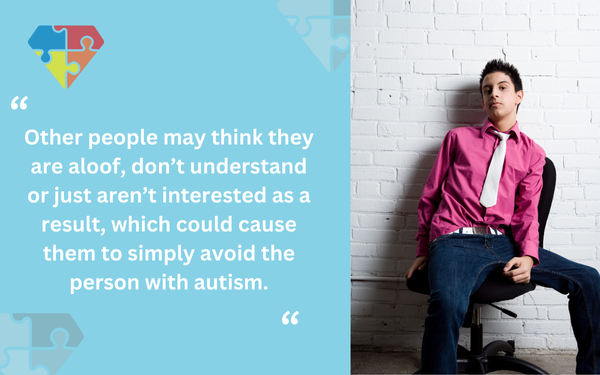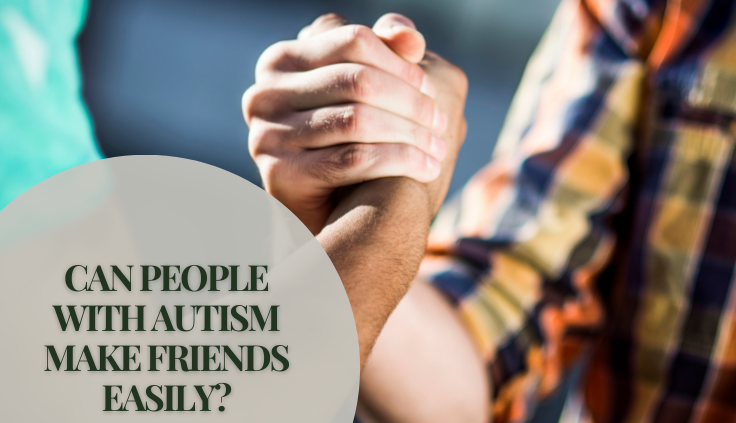Can People with Autism Make Friends Easily?
People with autism spectrum disorder (ASD) are often thought to be loners. They tend to spend more time by themselves than their neurotypical peers, seemingly from a very young age.
For many people on the autism spectrum, it’s not that they don’t want to make friends; it’s just that their neurodevelopmental disorder affects them in ways that either makes it difficult to do so or makes them feel overwhelmed when they interact with others.
People with autism are faced with challenges on a daily basis that others simply don’t. They have trouble communicating, may feel anxious or stressed in social situations, and might also experience sensory sensitivities in which they become easily overwhelmed when they hear loud noises, for example.
Of course, this doesn’t mean that people with autism can’t make friends, or that they don’t want to. Instead, it just means there are things they must overcome to do so.

Below, we’ll look at some of the common reasons why it might be harder for some people with autism to make friends as easily as their neurotypical peers.
Table Of Contents
They Struggle with Communication
A hallmark symptom of autism is a deficit in communication. Striking up a conversation might be very difficult for a person who has autism.
Even engaging in a conversation that someone else has initiated might be tough. They might not be able to find the right words to use, as their brains can have problems accurately interpreting and then expressing things like emotions.
This could cause them to become easily stressed, overwhelmed and/or anxious, which could result in them displaying a self-stimulatory behavior to try to calm themselves down.
They Don’t Understand Nonverbal Cues
Even if people with autism don’t become easily overwhelmed by conversations, they might still face challenges with understanding nonverbal cues. Unfortunately, these are a huge part of effective communication and can stand in the way of making friends.
Things such as facial expressions, tone of voice and body language all communicate thoughts and feelings. If a person with autism isn’t able to accurately interpret these nonverbal cues, it can lead to misunderstandings.
Other people may think they are aloof, don’t understand or just aren’t interested as a result, which could cause them to simply avoid the person with autism.

They Might Feel Anxious Socializing
Many people who have autism struggle with anxiety. This is caused by a number of things directly related to their disorder.
When they are in a new environment, interacting with new people or being bombarded with sensory stimuli, their brains may start to go “haywire” and cause them to feel overwhelmed. This could make them seem strange to other people, which could result in them being avoided.
If the person with autism has experienced this type of anxiety in the past, they may avoid socializing with others altogether because they are afraid of what might happen. This helps contribute to the loner stigma, making it harder for them to make friends.
They Might Not Understand Boundaries
Some people with autism latch onto others and don’t respect their boundaries as a result. If a person with ASD has a good social experience with another child, for example, they might consistently flock to that person since they are familiar and friendly.
This isn’t a problem in and of itself, but it could become one, depending on how far it’s taken. People with autism may not understand how other people perceive the world around them, and they might not know what is socially-acceptable and/or appropriate and what’s not.
They might invade other people’s space, not give them room, constantly follow them around and more. Over time, behaviors such as these may actually turn people off from becoming friends rather than bringing them closer.
How Can People with Autism Be Supported in Making Friends?
These challenges that people with autism face doesn’t mean that they can’t make friends. In fact, some people with ASD can indeed make friends quite easily.
At the same time, nearly all people on the autism spectrum struggle with some of the skills that are vital to making friends — namely communication and social interaction.
Applied behavior analysis, or ABA therapy, is a treatment plan that can help significantly in this regard. ABA therapy is considered the gold standard treatment option for people with ASD, in fact, for its ability to help patients build these skills, modify certain behaviors and live independently.
By using positive reinforcement, modeling, repetition and other strategies, ABA therapists help their patients learn new skills, which can lead to them making friends more easily.
Blue Gems ABA Helps Children with ASD Learn New Skills
People with autism can definitely make friends, though doing so may not be as easy for some as their neurotypical peers. This is due to the fact that many people on the autism spectrum struggle with social interactions and communication, two skills that are necessary to establish meaningful relationships.
At Blue Gems ABA, our team of dedicated professionals work with children with autism every day to help them build these skills and more. We craft personalized ABA therapy treatment programs that are designed specifically for each individual’s unique strengths and challenges, making it more effective.
To learn more, please contact us today.




